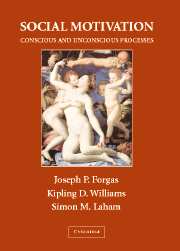Book contents
- Frontmatter
- Contents
- About the Editors
- List of Contributors
- Preface
- The Sydney Symposium of Social Psychology series
- 1 Social Motivation: Introduction and Overview
- PART I CONSCIOUS AND UNCONSCIOUS SOCIAL MOTIVATION: GENERAL ISSUES
- PART II SOCIAL MOTIVATION: COGNITIVE AND AFFECTIVE IMPLICATIONS
- PART III CONSCIOUS AND UNCONSCIOUS SOCIAL MOTIVATION: SOME CONSEQUENCES AND APPLICATIONS
- 14 Self-Regulatory Processes in Interracial Interactions: The Role of Internal and External Motivation to Respond without Prejudice
- 15 Exploring the Discrepancy Between Implicit and Explicit Prejudice: A Test of Aversive Racism Theory
- 16 Ostracism: When Competing Motivations Collide
- 17 Attentional and Regulatory Mechanisms of Momentary Work Motivation and Performance
- 18 Social Motivation and Object Relations: Narcissism and Interpersonal Self-Esteem Regulation
- 19 To Know or Not to Know: Consciousness, Meta-consciousness, and Motivation
- Author Index
- Subject Index
- References
19 - To Know or Not to Know: Consciousness, Meta-consciousness, and Motivation
Published online by Cambridge University Press: 04 August 2010
- Frontmatter
- Contents
- About the Editors
- List of Contributors
- Preface
- The Sydney Symposium of Social Psychology series
- 1 Social Motivation: Introduction and Overview
- PART I CONSCIOUS AND UNCONSCIOUS SOCIAL MOTIVATION: GENERAL ISSUES
- PART II SOCIAL MOTIVATION: COGNITIVE AND AFFECTIVE IMPLICATIONS
- PART III CONSCIOUS AND UNCONSCIOUS SOCIAL MOTIVATION: SOME CONSEQUENCES AND APPLICATIONS
- 14 Self-Regulatory Processes in Interracial Interactions: The Role of Internal and External Motivation to Respond without Prejudice
- 15 Exploring the Discrepancy Between Implicit and Explicit Prejudice: A Test of Aversive Racism Theory
- 16 Ostracism: When Competing Motivations Collide
- 17 Attentional and Regulatory Mechanisms of Momentary Work Motivation and Performance
- 18 Social Motivation and Object Relations: Narcissism and Interpersonal Self-Esteem Regulation
- 19 To Know or Not to Know: Consciousness, Meta-consciousness, and Motivation
- Author Index
- Subject Index
- References
Summary
INTRODUCTION
Consciousness is invariably a slippery construct, but especially so when it comes to considering its relationship to motivation. To take an everyday example, consider the case of scratching an insect bite. When bitten by a mosquito, one knows that scratching will ultimately just increase the itching. Sometimes one simply gives in to the urge and deliberately scratches the darn thing, knowing full well the subsequent price that will be paid. In this case, it is clear that the motivation to scratch was fully conscious. But what about the case in which one suddenly catches oneself scratching the forbidden itch? There is this moment of realization to the effect, “Ahh, that feels good, but oh, I didn't want to do that.” In one sense, such actions lack conscious awareness, as the action that one is engaged in is precisely counter to one's goals. Moreover, there is the sense in which one has “caught” oneself “absentmindedly” engaging in the forbidden behavior. In another sense, however, the action and its concomitant motivation are conscious. That is, after one catches oneself, there is an appreciation of the pleasure that the scratching afforded as it temporarily relieved the itch. In short, when one catches oneself scratching an itch, there is a distinct sense that both the motivation to scratch (the itch) and the action itself (scratching) have been consciously experienced.
- Type
- Chapter
- Information
- Social MotivationConscious and Unconscious Processes, pp. 351 - 372Publisher: Cambridge University PressPrint publication year: 2004

